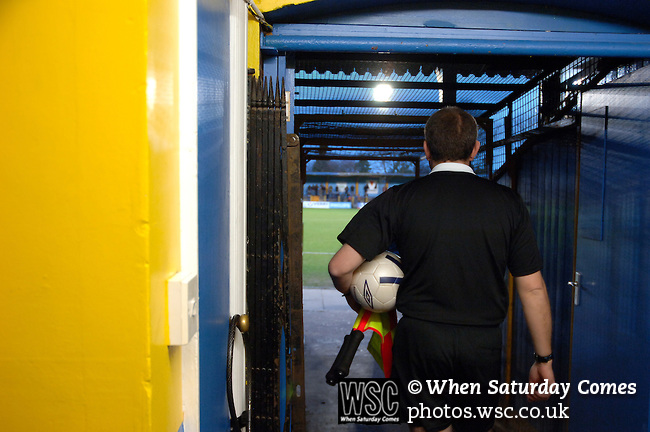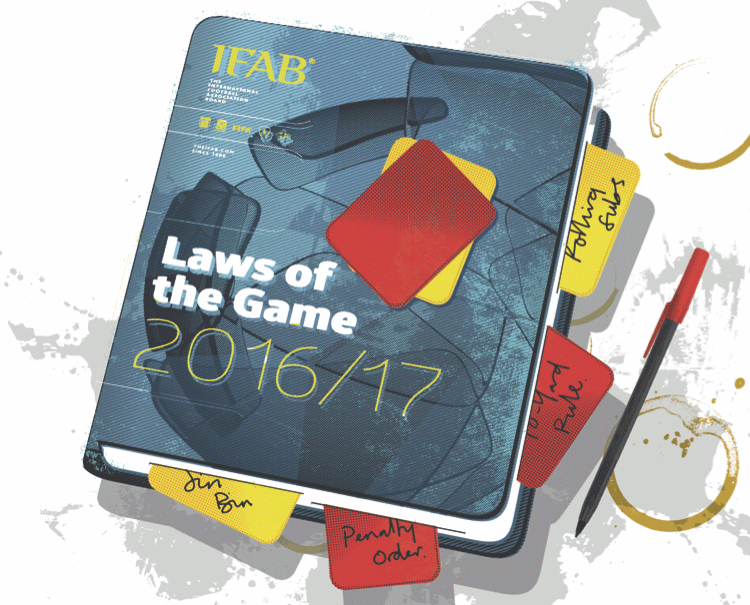
The FA will trial sin-bins in lower leagues from next season but these changes, along with others proposed, will not be welcomed by all referees
3 May ~ My friend Pete is a bus driver who referees on Sunday mornings – which is one of the reasons he doesn’t like changes to the Laws of the Game. Pete reads all the Law briefings from the County FA and joins in the discussions at our local Referees’ Association, but the players and managers in his games don’t. They mostly rely on hazily retained views from TV and radio pundits. If Robbie Savage squeals “For me that’s never handball!” then grassroots referees will feel the backlash if their interpretations differ from his.
IFAB – the International Football Association Board and “independent guardians of the Laws of the Game” – are to allow the option of introducing temporary suspensions (sin-bins) in games below the top level. As long ago as 2003 Graham Poll highlighted the impracticality of a lone match official monitoring a sin-bin in grassroots football. If there is a demand then surely temporary suspensions would be better trialled in professional games, where the four officials are better equipped to manage them.
But is there a demand? Michael Oliver’s sending off of Ander Herrera in the Chelsea v Manchester United FA Cup tie might have prompted a widespread call for use of a sin-bin but it didn’t. In any case from what we so far know of the IFAB proposal, the other three players who were shown yellow cards would also have been sidelined. This would have changed the dynamic of the match at least as much as the red card did. Part of IFAB’s brief is to provide “what football wants”, but this case seems more like what David Elleray wants. Now the technical director of IFAB, he has been advocating sin-bins since the mid-1990s.
In England one of the current IFAB changes, repeat substitutions, is not really a change. They have been used in under-16 football for years and are an accepted part of the game. Since 2012-13, “roll-on roll-offs” have been trialled in over-16 and local adult football. Competitions are given the option of implementing this change and in my county barely half the leagues originally took it up.
It does apply in all non-Senior County Cups and the perils of allowing aspects of the Laws to become optional were illustrated in a tie I saw last season, where the home team were from a league in which repeat subs were used and the away side wasn’t. The referee was confronted quite angrily by the visitors when the repeat changes became apparent and was loudly encouraged to “sort it out”.
The increased participation argument for roll-on roll-off is gaining ground. Players who are perennial substitutes are more inclined to turn up if they are likely to get a run-out more often. Those who have taken a knock (or are just knackered) can get time to recover and players returning from injury can be eased back into fitness. The minor downside for referees is that they are required to manage each substitution according to Law Three, which means repeated visits to the halfway line. Additionally, unlimited substitutions offer unlimited scope for breaking up the game when defending a lead or hanging on for a point and some near-farcical incidents have resulted locally.

IFAB are developing a strategy to use the Laws “to develop the game by focusing on fairness and integrity, increasing universality and inclusion, and embracing technology”. Enhancing the role of the captain will be part of this. A previous attempt to import what was seen as a good idea from rugby – making players retreat ten yards if they argued about a free-kick – failed largely because footballers don’t behave like rugby players: Oliver’s involvement of the captain at Chelsea clearly had no impact on Herrera.
Just by saying only the captain can speak to the referee won’t of itself mean that other players won’t join in or stop arguing. Without a significant culture shift this could be a difficult change for referees (and captains) to implement at local level. It’s probably worth a try though.
IFAB also promise potentially welcome Law changes addressing handball and time wasting, and they are considering changing the format of penalty shootouts from “ABAB” to “ABBA” (with both sides taking two kicks in a row, bookended by the same team taking the first and last one). Quite how this will correct an apparent 60:40 statistical bias in favour of whoever goes first isn’t clear, as someone will always have the pressure of taking the decisive kick.
When I asked Pete (his real name) what he thought about this he just shrugged his shoulders. It’s not a priority for him and he doesn’t like changes to the Laws of the Game. Roy Williams
This article first appeared in WSC 363, May 2017. Subscribers get free access to the complete WSC digital archive – you can find out more details here
Photo by Simon Gill/WSC Photos: The referee walks out for St Albans v Morecambe, 2007
Illustration by Gary Neill